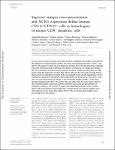Superior antigen cross-presentation and XCR1 expression define human CD11c+CD141+ cells as homologues of mouse CD8+ dendritic cells
Bachem, Annabell
Güttler, Steffen
Hartung, Evelyn
Ebstein, Frédéric
Schaefer, Michael
Tannert, Astrid
Salama, Abdulgabar
Movassaghi, Kamran
Opitz, Corinna
Mages, Hans Werner
Henn, Volker
Kloetzel, Peter-Michael
Gurka, Stephanie
Kroczek, Richard
In recent years, human dendritic cells (DCs) could be subdivided into CD304+ plasmacytoid DCs (pDCs) and conventional DCs (cDCs), the latter encompassing the CD1c+, CD16+, and CD141+ DC subsets. To date, the low frequency of these DCs in human blood has essentially prevented functional studies defining their specific contribution to antigen presentation. We have established a protocol for an effective isolation of pDC and cDC subsets to high purity. Using this approach, we show that CD141+ DCs are the only cells in human blood that express the chemokine receptor XCR1 and respond to the specific ligand XCL1 by Ca2+ mobilization and potent chemotaxis. More importantly, we demonstrate that CD141+ DCs excel in cross-presentation of soluble or cell-associated antigen to CD8+ T cells when directly compared with CD1c+ DCs, CD16+ DCs, and pDCs from the same donors. Both in their functional XCR1 expression and their effective processing and presentation of exogenous antigen in the context of major histocompatibility complex class I, human CD141+ DCs correspond to mouse CD8+ DCs, a subset known for superior antigen cross-presentation in vivo. These data define CD141+ DCs as professional antigen cross-presenting DCs in the human.
No license information
Related Items
Show related Items with similar Title, Author, Creator or Subject.
-
2010-05-24ZeitschriftenartikelInducible costimulator (ICOS) blockade inhibits accumulation of polyfunctional T helper 1/T helper 17 cells and mitigates autoimmune arthritis Frey, Oliver; Meisel, Juliane; Hutloff, Andreas; Bonhagen, Kerstin; Bruns, Lisa; Kroczek, Richard; Morawietz, Lars; Kamradt, ThomasObjectives: Inducible costimulator (ICOS) and its ligand (ICOSL) regulate T and B cell responses. Glucose-6-phosphate isomerase (G6PI)-induced arthritis requires T and B lymphocytes. It was hypothesised that blocking ...
-
2016-02-26ZeitschriftenartikelLocal T/B cooperation in inflamed tissues is supported by T follicular helper-like cells Van, Dana Vu; Beier, Katja C.; Pietzke, Lea-Jean; Baz, Maysun S. Al; Feist, Randi K.; Gurka, Stephanie; Hamelmann, Eckard; Kroczek, Richard; Hutloff, AndreasAutoimmune diseases and other inflammatory conditions are characterized by large lymphocytic tissue infiltrates in which T and B cells can be found in close contact. Here, using a murine airway inflammation model, we compare ...
-
2013-04-15ZeitschriftenartikelGiardia duodenalis arginine deiminase modulates the phenotype and cytokine secretion of human dendritic cells by depletion of arginine and formation of ammonia Banik, Stefanie; Viveros, Pablo Renner; Seeber, Frank; Klotz, Christian; Ignatius, Ralf; Aebischer, ToniDepletion of arginine is a recognized strategy that pathogens use to evade immune effector mechanisms. Depletion depends on microbial enzymes such as arginases, which are considered virulence factors. The effect is mostly ...

